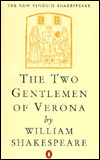Dr. Michael Delahoyde
Washington State University
THE TWO GENTLEMEN OF
VERONA
ACT III
SCENE i
Although it may be yet another indication of multiple revisions, the
scene begins with the Duke, Proteus, and Thurio entering. The first
words are the Duke's, requesting in two lines that Thurio go away.
"Exit Thurio"!
Like a cheesy proto-Iago, and laying on the humility pose pretty
thick, Proteus tells the Duke about his daughter and Valentine
planning to elope. Proteus feigns concern about the Duke's "age"
(III.i.16) and the potential for news of this treachery to send the
Duke to "your timeless grave" (III.i.21). The Duke, who clearly has
preferred the wealthier Thurio all along, feels betrayed. Proteus
asks not to be mentioned as a rat, and he scurries off as Valentine
approaches.
The Duke laments to Valentine his daughter's refusal of Thurio and
announces that he'll supply no dowry, partly because he claims to be
in love with a woman whom he'd like to marry: "a lady in Verona here"
(III.i.81), as the First Folio reads. Editors correct this to "Milano."
In order to pump Valentine for information and self-revealing advice
about wooing, the Duke explains, "For long agone I have forgot to court;
/ Besides, the fashion of the time is chang'd" (III.i.85-86). Valentine
insists that one cannot believe a woman's words at face value and
recommends that the Duke ply her with gifts. What Valentine says confirms
the Duke's worst suspicions, especially regarding the proper use of a rope
ladder to get to women in upper tower rooms. One can conceal such a ladder
under one's cloak. The Duke yanks Valentine's and discovers the ladder.

|
Valentine is also carrying a love letter to Silvia, which the Duke reads
out loud. The poem is followed by the triumphant line, "Silvia, this
night I will enfranchise thee" (III.i.151). [Although it sounds as if he
intends to have her run a local Burger King, "enfranchise" here means
"set free," but it's still a goofy declaration.] The Duke banishes
the would-be eloper. "Valentine stands revealed as a complete and utter
ass, but his response to the Duke's subsequent sentence of banishment is
so deeply felt, so touchingly idealistic, and so gracefully expressed as
to require a complete shift in the actor's presentation of the character
and in the audience's attitude to him" (Wells 41-42). Valentine agonizes:
"To die is to be banish'd from myself, / And Silvia is myself"
(III.i.171-172). His following lines are mildly famous: "What light is
light, if Silvia be not seen? / What joy is joy, if Silvia be not by?"
(III.i.174-175).
|
Proteus returns with Launce, who mixes up "vanish'd" and "banish'd"
(III.i.218-219). Proteus reports Silvia's reaction to the news,
saying that she was "Wringing her hands, whose whiteness so became
them / As if but now they waxed pale for woe" (III.i.229-230) --
seemingly an allusion to Queen Elizabeth, who prided herself on her
white long-fingered hands. Proteus comforts Valentine somewhat, saying
he'll deliver the letter and act as go-between, but that Valentine had
better get out of town. An offhanded and correct reference to the Ducal
Palace outside the city gates, and near the "North-gate" (III.i.260,
373), suggests that Shakespeare knew the Castello Sforzesco first-hand
(Farina 28).
Launce recognizes that "my master is a kind of knave" (III.i.264). When
Speed arrives, Launce mistakes the word "mastership" for "master's ship"
(III.i.281f), and Speed remarks: "Well, your old vice still: mistake the
word" (III.i.284). Launce claims that he himself is in love with a milkmaid,
one who "hath more qualities than a water-spaniel" (III.i.272-273). He and
Speed discuss an itemized list of qualities possessed by the woman. Love,
or chivalry, helps Launce rationalize all negative points into virtues.
That the woman "hath no teeth to bite" (III.i.344) is almost word for word
from a letter written by Sir Christopher Hatton to the Queen in 1573,
promoting himself and smearing de Vere: "reserve it to the Sheep, he hath
no tooth to bite, where the boar's [Oxford's] tusk may both raze and tear"
(qtd. in Clark 313). [How Launce's milkmaid is in any way a parody of
Queen Elizabeth (Ogburn and Ogburn 1088) I do not understand.]
At the end of the scene, when Speed finds out that he
was supposed to be at the North-gate, Launce derives some glee from the
idea that Speed will be beaten: "Now will he be swing'd for reading my
letter -- an unmannerly slave, that will thrust himself into secrets.
I'll after, to rejoice in the boy's correction" (III.i.382-384).
SCENE ii
Thurio complains to the Duke that despite the banishment of Valentine,
Silvia is even less tolerant of him. The Duke enlists Proteus to help
Thurio woo a miserable Silvia; she's likely to listen to Valentine's
friend about how unworthy Valentine really is. A letter from Christopher
Hatton's friend Dyer, giving Hatton advice on how to deal with Oxford,
also seems to be behind part of this scene (Ogburn and Ogburn 226):
The best way is to slander Valentine
With falsehood, cowardice, and false descent,
Three things that women highly hold in hate.
(III.ii.31-33)
Regarding Thurio, Proteus gives this key advice:
As much as I can do, I will effect.
But you, sir Thurio, are not sharp enough:
You must lay lime to tangle her desires
By wailful sonnets, whose composed rhymes
Should be full-fraught with serviceable vows.
(III.ii.66-70)
Thurio proposes they go into the city to drum up some musicians.
He has a sonnet stored up that should do the trick. What a jackass.
Act IV
Shakespeare Index
